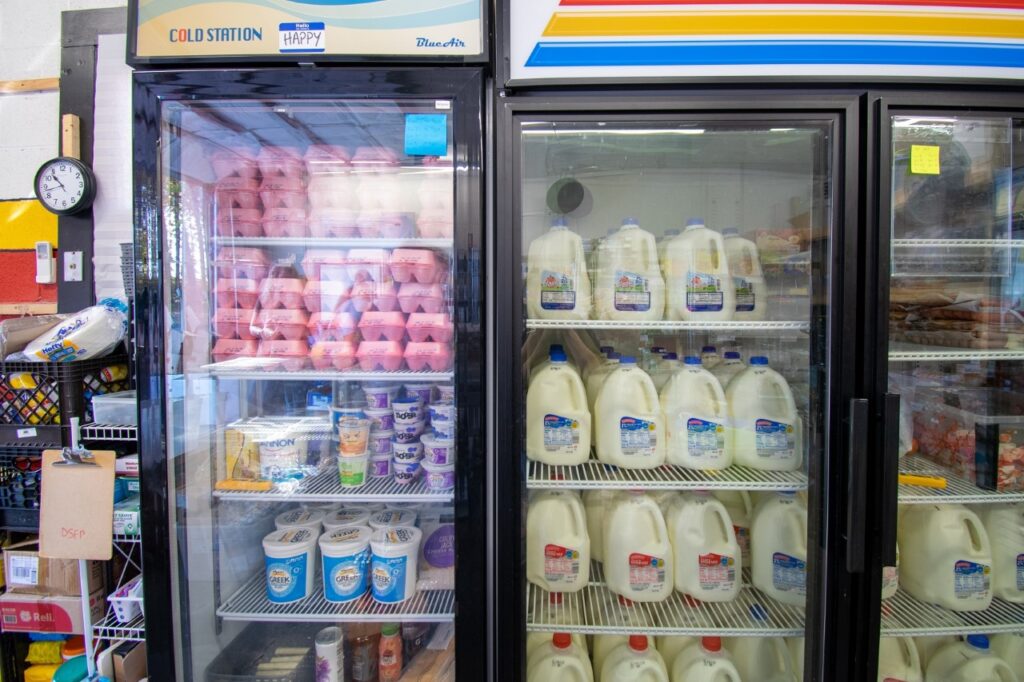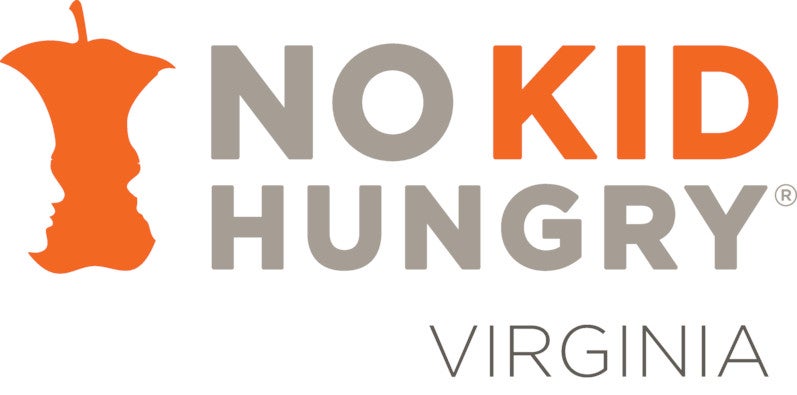During this season of celebration and gratitude, No Kid Hungry Virginia is reflecting on the people and organizations who inspire us. This is the second installment in a multi-part series that highlights the important work of No Kid Hungry Virginia grantees who ensure that kids and families stay healthy and nourished, all year round.
The Piedmont Environmental Council (PEC) works throughout Virginia’s northern Piedmont region to conserve land, create thriving communities, strengthen rural economies, celebrate historic resources, protect air and water quality, build smart transportation networks, promote sustainable energy choices, restore wildlife habitat, and improve people’s access to nature. This summer, with a No Kid Hungry Virginia grant of $50,000, PEC partnered with local farmers and food pantries to provide food insecure residents with dairy milk, eggs, and fresh fruits and vegetables.
Continue reading below to learn more about The Piedmont Environmental Council’s Farm to Food Bank initiative.
The COVID-19 pandemic has exacerbated long-standing systemic health, social and economic inequities, disproportionately impacting communities of color. How does racial equity and justice continue to inform the Piedmont Environmental Council’s work?
PEC is a local, community-based organization and our Farm to Food Bank initiative was developed in response to a community need that we were hearing about from both front-line food providers and from area dairy farmers. Our food pantry partners understand the disparities and racial inequities underlying hunger in our communities much better than we do. That said, we know that lack of access to healthy food is deeply interwoven in racially discriminatory practices.
We are listening and responding based on our core competencies, which in this case, include: agriculture, connecting with local farmers and bringing together broad-ranging partners to tackle a societal need. It has been, and continues to be, a journey for us to put an intentional lens on our programs and be more inclusive in our outreach and program development.
This summer, the Piedmont Environmental Council partnered with local farmers to roll out a milk and egg donation program. Can you explain the need in the community in which The Piedmont Environmental Council was responding?
When the Covid-19 pandemic shut down schools and other large-scale institutions that typically buy pint and half-pint sized milk products from the Maryland and Virginia Milk Producers Cooperative, PEC learned that local dairy farmers were having trouble selling their product, as the usual modes of distribution paused. At the same time, school children who typically got their nutrition needs met at school were turning to local food pantries at such volume that food pantries were not able to keep their dairy cases stocked. We saw an opportunity to make use of our strong partnerships with local dairy farmers and to forge new relationships with area food banks to connect these two – meeting two critical food supply chain needs at once, helping struggling farmers and families in need at the same time. Over time, that evolved into a similar effort involving beef and then pork.
By this past summer, although many food supply chain issues had been resolved, some needs still remained, as food banks continued to experience unusually high demand, particularly in the area of milk and, by then, eggs. Schools may be back in session, but pandemic-related job losses and cutbacks are still real and still disproportionately affecting families without sufficient access to fresh, healthy food.
We live in a region that successfully produces an abundance of fresh dairy, produce and high-quality meat. By allowing us to extend our initial dairy initiative through the summer and early fall, and to expand it to include donation of eggs, also from local farms, No Kid Hungry has helped us get that food to the people who need it most.
(L) Robin Kinkead and Jen Taylor of Dulles South Food Pantry. The freezer behind them is stocked with ground meat provided by Whiffletree Farms through PEC’s Farm to Food Bank initiative. (R) Chicken provided by Whiffletree Farms through PEC’s Farm to Food Bank Initiative.
What was the process PEC went through to connect the dots between the community, local food pantries, and farmers? Did the organization forge new collaborations in the process?
Our conservation work has allowed us to develop strong relationships with numerous dairy farmers in the Piedmont. One of those farmers is Ken Smith, a fourth-generation dairy farmer in Fauquier County and president of the Maryland and Virginia Milk Producers Cooperative Association (MDVA Milk). When we learned that the demand for dairy far outstripped supply in local food pantries, we began talking with our farm and nonprofit partners about how we could help address the needs of both dairy farmers and food-insecure families that had been magnified by the pandemic. Most family farms in Fauquier and the surrounding region send their milk to be processed by MDVA Milk and distributed under the Co-op’s Maola brand. We asked Ken to request that the cooperative adjust some of its processing, staffing, and delivery operations to make the shift from schools to food pantries.
Meanwhile, PEC began discussions with local food pantries about the extent of their needs for fresh milk for their clients. Our initial conversations with the Fauquier Community Food Bank and with Rappahannock Food Pantry suggested the need was about 250 gallons of milk a week. PEC raised seed funding from a local foundation, the PATH Foundation, and from individual donors. With the start-up funding, we launched the initiative in May 2020 with deliveries of 250 gallons of milk to the two food pantries. We were able to scale up the program over time as we raised more funds and engaged new food pantry partners. By the fall of 2020, we were delivering almost 1,000 gallons weekly to 24 food pantries throughout the Virginia Piedmont. Starting in the summer of 2021, thanks in part to No Kid Hungry’s grant, we were able to start a new partnership with a local dairy farmer to provide local eggs and chicken in addition to milk.
What has been the impact of PEC’s summer milk and egg donation program?
Through this summer’s Farm to Food Bank initiative, PEC has purchased and donated 5,950 gallons of milk and 3,200 dozen eggs to seven food pantries and Blue Ridge Area Food Bank, which additionally distributes to more than 30 charitable food partners. In total, since May 2020, PEC has provided 36,000 gallons of milk to 24 food pantries.

Milk and eggs provided by PEC to the food pantry.
Looking ahead, what does the milk and egg donation program look like in the next 6 months? In the next year?
From the start, PEC had intended for the initiative to be a rapid-response effort that we would phase out when schools and school nutrition programs reopened. As expected, demand from our food pantry partners for milk and eggs has decreased significantly as schools have resumed in-person. For a few food pantries, demand for fresh milk and eggs continues to be fairly high and we are providing milk to them through the rest of the year and stand ready, with the alliances we have built, to respond if the need reoccurs.
At our Community Farm at Roundabout Meadows, we plan to increase food production and expand our partnership with Loudoun Hunger Relief and other Loudoun human services organizations. Our 2022 plans are to increase food production by 25%, and to engage more than 400 volunteers.
Join No Kid Hungry Virginia in thanking The Piedmont Environmental Council for its commitment to supporting families, food pantries, and farmers. To learn more about The Piedmont Environmental Council’s work, go to https://www.pecva.org/.







